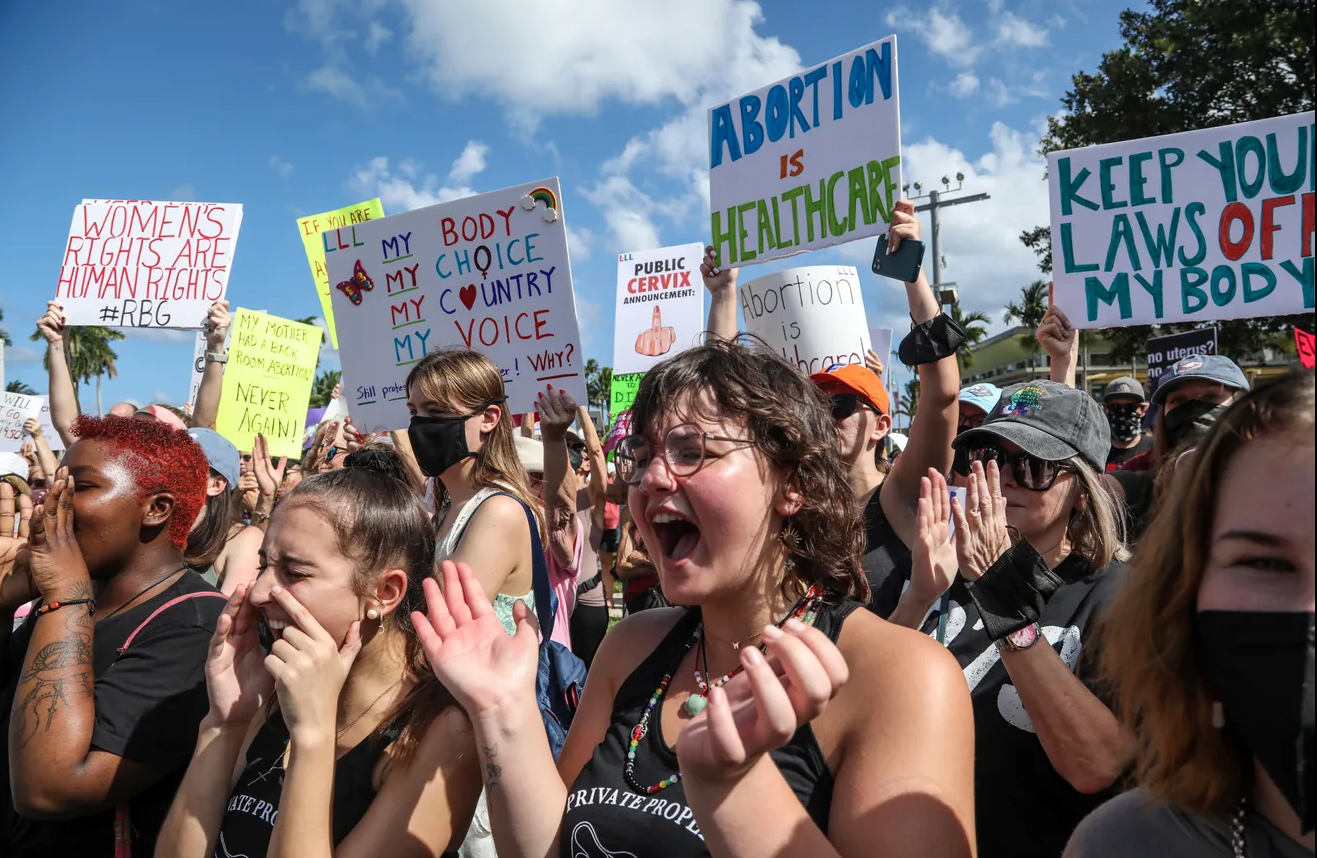A Woman’s Right to Choose
By: Khushi Khan
Trigger Warning: This article may include themes and words that may be disturbing to some.
Photo Courtesy of The Palm Beach Post
"I have dreams, hopes and ambitions. Every girl graduating today does," says Paxton Smith, a high school valedictorian in Texas. She later added, "And without our input and without our consent, our control over that future has been stripped away from us. We cannot stay silent.". The issue of legalizing abortion is largely debated on several media platforms. Abortion is a procedure to end a pregnancy using surgery to terminate the fetus from the uterus. The pro-life movement believes that abortion is murder and against religious grounds, therefore, it should be restricted. However, there are several reasons why a woman is vulnerable to getting an abortion such as mental health, financial stability, and/or unfortunate circumstances resulting in pregnancy. Abortion should be a women’s individual choice, therefore, it should be legalized in society.
Pregnancy resulting from rape is an exception to having abortion legalized. Among adult women, an estimated 32,000 pregnancies result from rape each year. Imagine a woman was raped and later became pregnant. Should she not have the right to abort the child? Put yourself in her shoes. Can you imagine the pain she might feel every time she looks at the child? Should she be forced to endure this? Former Supreme Court Justice Sandra Day O’Connor wrote in the 1992 decision in Planned Parenthood v. Casey, “The ability of women to participate equally in the economic and social life of the Nation has been facilitated by their ability to control their reproductive lives.”. Legalizing abortion means that the law recognizes a woman as a person. It says that she belongs to herself. That it is our body, our freedom, our choice.
Women who are not in a healthy mental state are vulnerable to having an abortion because they cannot raise a child. Women who are denied an abortion are more likely to initially experience higher levels of anxiety, lower life satisfaction and lower self-esteem. If we as humans cannot give a child a healthy life then what’s the point of bringing them into this world? What will their future be like? Will they be successful? Complete education? Live in poverty?
Due to not being financially strong women are not able to raise a child to their full potential. The rights a woman has are not only for herself but also for the child relying on her to live. A survey in the peer-reviewed Perspectives on Sexual and Reproductive Health asking women why they had an abortion found that 73% of respondents said they could not afford to have a baby. With anti-abortion laws, we are putting the human race in jeopardy. You are not going to carry this child for nine months. We are. You are not the one who is going to raise this child. We are. You are not going to face the consequences. We are.
Correspondents of the pro-life movement argue that abortion is murder and against moral and religious grounds. Although abortion terminates the fetus, it is also a known fact that abortion does not cause harm to the fetus itself. According to Britain’s Royal College of Obstetricians and Gynaecologists, “most neuroscientists believe that the cortex is necessary for pain perception.” The cortex does not become functional until at least the 26th week of a fetus’ development, long after most abortions are performed.
To conclude, abortion should be legalized and be the woman’s choice if she chooses to have one by reasons of unfortunate circumstances resulting in pregnancy, mental health effects and not being financially stable to raise a child. We cannot stay silent. Why are we allowing men to decide what we choose to do with our bodies? We can take action against the pro-life movement by advocating the pro-choice movement. Join, volunteer, or donate to a local pro-choice group, abortion clinic, or family planning clinic, and ask your friends to do the same. Stand up for yourself, your sister, your friends. We deserve the right to have a voice because after all, it is a women’s right to choose.
Resources
Biggs, M Antonia et al. “Women's Mental Health and Well-being 5 Years After Receiving or Being Denied an Abortion: A Prospective, Longitudinal Cohort Study.” JAMA psychiatry vol. 74,2, 2017, https://jamanetwork.com/journals/jamapsychiatry/fullarticle/2592320
Casey, Robert P. et al. “Planned Parenthood of Southeastern Pennsylvania”. Law.cornell.edu, 1992, https://www.law.cornell.edu/supremecourt/text/505/833
Chappell, B. “High School Valedictorian Swaps Speech To Speak Out Against Texas' New Abortion Law”. npr.org, 2021, https://www.npr.org/2021/06/03/1002831545/high-school-valedictorian-swaps-speech-to-speak-out-against-texas-new-abortion-l
Fowler, Daniel. "Sociologists Find Lowest-Paid Women Suffer Most From Motherhood Penalty". Press-News.Org, 2010, https://press-news.org/6926-sociologists-find-lowest-paid-women-suffer-most-from-motherhood-penalty.html
Holmes, M M et al. “Rape-related pregnancy: estimates and descriptive characteristics from a national sample of women.” American journal of obstetrics and gynecology vol. 175,2, 2018, https://www.ajog.org/article/S0002-9378(96)70141-2/fulltext
Rocca, Corinne H et al. “Women's emotions one week after receiving or being denied an abortion in the United States.” Perspectives on sexual and reproductive health vol. 45,3, 2013, https://www.researchgate.net/publication/256488797_Women%27s_Emotions_One_Week_After_Receiving_or_Being_Denied_an_Abortion_in_the_United_States
